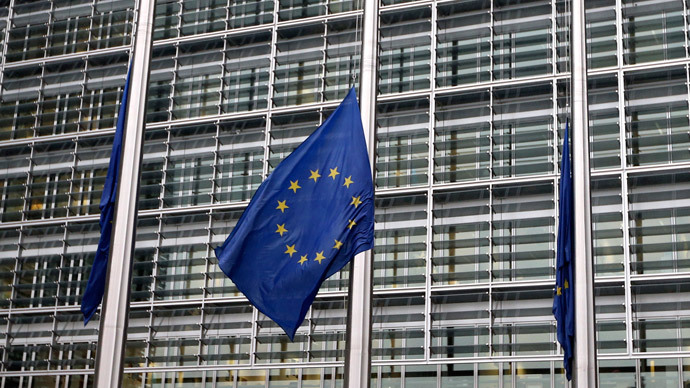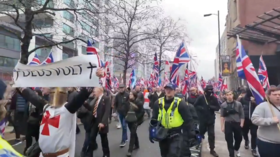EU widens sanctions against Moscow and Ukraine rebels, implementation delayed

The European Union has announced new sanctions against Russian officials and Ukrainian militias, but will postpone enforcing for a week, pending new peace talks in Minsk on Wednesday, according to French foreign minister Laurent Fabius.
"The principle of these sanctions remains but the implementation will depend on results on the ground. We will see by [next] Monday and see how the meeting in Minsk went," said French foreign minister Laurent Fabius.
The foreign ministers of the 28 European Union member states added five Russian citizens, TASS sources said. The ‘black list’ also reportedly includes 14 members of the eastern Ukrainian militia and nine organizations the EU considers responsible for the escalation of violence in Ukraine.
The four-way talks in the Belorussian capital between Russia, Ukraine, Germany and France are set to take place on Wednesday.
The EU will decide whether to implement the new restrictive measures against Russia on Monday, February 16, after evaluating the results of the Minsk negotiations, Fabius added.
READ MORE: Lithuania wants to supply weapons to Ukraine amid ongoing civil war
German Foreign Minister Frank-Walter Steinmeier expressed cautious optimism that the Minsk meeting will lead to the “first steps... towards a ceasefire,” Reuters reports.

If a peace plan is successfully negotiated another decision of EU foreign ministers will be required to stop the sanctions, a safeguard demanded by Philip Hammond, the UK Foreign Secretary.
Britain had to fight a move to abandon the sanctions from Greece, Cyprus, Austria and other countries hostile to ratcheting up pressure on Russia.
There is a lack of unity over the need for new restrictive measures within the bloc, with Spain evaluating the losses suffered by the EU in the ‘sanctions war’ with Russia at €21 billion ($23.78 billion).
"Sanctions have had a heavy cost for us all; the EU has so far lost €21 billion. In Spain, we have been badly hit in terms of agriculture and tourism," Jose Manuel Garcia-Margallo, the Spanish foreign minister, said.
READ MORE: Ukraine crisis: Putin, Poroshenko, Hollande, Merkel voice plans for Minsk meeting
Also on Monday, Czech President Milos Zeman once again called for Russian sanctions to be lifted, saying they aren’t bringing the desired results.
“My goal isn’t helping Putin, but I long for solid trade and economic relations between the Czech Republic and Russia, which shouldn’t be hampered sanctions. Especially, if those sanction are useless,” said Zeman, as cited by TASS.
Greek prime minister, Alexis Tsipras, also spoke against Russian sanctions, stressing that the Ukrainian crisis must be only solved behind the negotiation table.
“The difficult way of talks is always favorable to the easy way of sanctions, which leads to a dead end,” Tsipras said after his meeting with Austrian Chancellor, Werner Faiman, in Vienna.
The Greek PM also stressed that the Wednesday’s peace talks in Minsk must not be viewed as “the last chance” for Russia.
Relations between Moscow and the West have deteriorated after Russia reunited with Crimea last March and the eruption of military conflict in Ukraine.
Despite failing to provide any convincing proof, the US and EU blame Russia for masterminding the Ukrainian conflict and supporting the rebels fighting the Kiev government in the south-east of the country – claims repeatedly denied by Moscow.
Last June, Washington and Brussels switched from individual sanctions against Russian politicians and businessmen to wider restrictive measures, targeting whole sectors of the country’s economy.
The Russian authorities replied by introducing a ban on food imports from EU, the US and other countries, which supported the sanctions.
The Ukraine conflict began last April when Kiev sent regular forces and volunteer battalions to the southeastern Donetsk and Lugansk regions, after rebels there refused to recognize the country’s new, coup-imposed authorities.
The death toll in the Ukraine conflict has exceeded 5,300 people, with over 12,000 injured, according to UN estimates.












